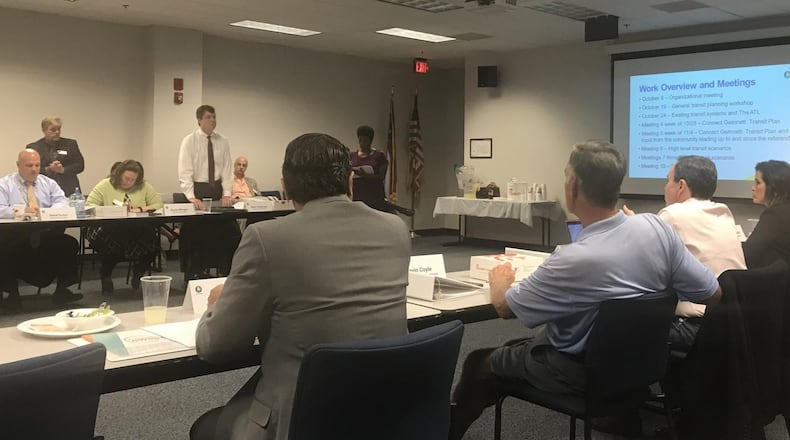Gwinnett's new transit review committee — a group with the weighty task of helping shape the future of public transportation in the county — held its first meeting Tuesday night.
And the group's composition has already raised at least a few eyebrows.
With appointments made by the county commission and a number of different community groups, a variety of perspectives will be represented on the 13-person committee. But only two current members are people of color.
One of those members, Farooq Mughal, said that's concerning.
Black, Latino and Asian residents account for more than 60 percent of Gwinnett County's population. Geography and socioeconomic factors also mean that minority groups are likely to be disproportionately affected by whatever decisions are made about the county's transit future.
Mughal was appointed to the transit committee by District 4 Commissioner Marlene Fosque and also serves as the chairman of Gwinnett’s community outreach advisory board. He said he was surprised by the transit group’s make-up during Tuesday’s mostly organizational meeting and feels obligated to bring in as many voices as possible.
He said he already spoke with a fellow member — one of two who volunteered to serve as the committee’s chairperson — about holding a forum with leaders from Gwinnett’s diverse communities.
“We can learn a lot from them,” Mughal said. “We’re not there to make decisions, we’re there to basically learn from the experience of multiple constituencies.”
Gwinnett Commission Chairman Charlotte Nash said the majority of the committee’s appointments were left to community organizations to encourage independence from the county government. She said the county is interested in “a wide range of perspectives and opinions” on transit, regardless of how the committee is comprised.
“We will be looking for other ways to engage different segments of the community to ensure we incorporate their ideas into the transit discussion,” Nash said. “Certainly, the committee meetings are public and we encourage attendance by everyone.”
The transit review committee was formed largely as a reaction to Gwinnett's latest referendum on joining MARTA, a March special election that failed by an 8-point margin. Had the referendum passed, Gwinnett would've joined MARTA and residents would've paid an additional 1 percent sales tax to cover the cost of more than $5 billion worth of projects included in the county's existing transit expansion plan.
The review committee is tasked with taking another look at the plan, soliciting input from the public and submitting a report with recommendations on potential changes to the county. The group is charged with doing all that in the span of 10 meetings held before the end of the year.
The task won’t be an easy one, but transit in Gwinnett County never is. And the handful of residents who spoke during the public comment period of Tuesday night’s meeting offered committee members a glimpse of the disparate opinions they’ll be hearing over the coming weeks.
There was Duluth’s Ronald Roquemore, who voted against March’s referendum and is skeptical of the need for Gwinnett County Transit, which currently consists of seven local bus routes and five others that take commuters from Gwinnett park-and-rides to the Atlanta area.
“I have to this day not seen one bus full,” he said.
Then there was Harriet Bradley of Norcross, a regular transit user who urged the committee members to go out and ride the system before they pass judgment.
“I want to assure you, the buses are full,” Bradley said. “Especially that No. 10.”
Mikesha Walker, a representative from a local transit workers union, also spoke.
Like Mughal, she raised concerns about the committee’s composition. She said transit workers could offer valuable input on things like how to make bus routes more efficient and, one way or another, will feel the direct effect of recommendations made by the committee.
“Please don’t forget the workers,” Walker said.
About the Author
The Latest
Featured



